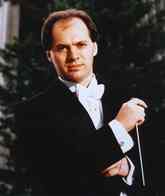
The name may be known to some readers, in another context. Maestro Minczuk is also the principal conductor of the Brazilian Symphony Orchestra (OSB), based in Rio de Janeiro. In January, the OSB announced that all the players in the orchestra would be “evaluated,” on an individual basis. Clearly many OSB musicians felt their job-security was threatened by this – as far as they were concerned, they were being asked to re-audition for their positions – and a number of the players refused to comply. As a result, about three dozen were let go. In order to replace them, the OSB held international auditions in New York and London, in the spring.
And when Minczuk recently went guest-conducting in Europe, grumblings of discontent about his handling of the situation in Brazil were heard from orchestral players in Odense, Denmark, and Liverpool, England. (However, they played under him anyway.)
On the other hand, Minczuk’s mentor, the celebrated conductor Kurt Masur, issued a statement of support for the embattled conductor and his work with the OSB. Masur wrote, “I know the current music director, Maestro Roberto Minczuk, as a great and honest human being.”
So I thought Minczuk might welcome the opportunity to sit down with me and explain his side of the story. And at first, that seemed to be the case: when I initially contacted the Calgary Philharmonic, a staffer assured me that Minczuk would be “thrilled to do the interview.” Then, a few days later, I was asked to give some indication of what questions I would like to ask. I complied (departing from standard journalistic practice), and forwarded a list of a dozen questions about the situation in Brazil and also his work in Calgary.
Today I received an email from the Calgary telling me that Minzcuk would speak to me only if the conversation was limited to the CPO. He has decided not to answer questions about events in Brazil. Here’s a direct quote from the email:
“He is not the spokesperson on the situation there and has stopped talking about it to the media. He has often been portrayed as the individual responsible for the evaluations, however it’s not the case; it was actually a board decision and Roberto prefers that questions about it be directed to the OSB rather than to him.”
I got on the phone and called a publicist at the CPO. “I can’t imagine how I could do the interview without in some way touching on the situation in Brazil,” I said. “It’s the elephant in the room. And I’m very open to maestro Minczuk giving his side of the story.”
No, I was told, it wasn’t possible at this time. Maybe later, when the situation is resolved.
So this is not an interview with Roberto Minczuk.
What I can report, however, is that Minczuk’s involvement in the dispute in Brazil has not gone entirely unnoticed here in Canada. Apparently, some musicians in the Vancouver Symphony Orchestra made it known to their own management that they would rather he not appear with the orchestra as a guest conductor. The VSO will not confirm or deny this – but Mark Tetreault, director of orchestral services for the Canadian Federation of Musicians, alluded to it in a recent conversation I had with him.
As well, the Canadian Federation of Musicians supported an international boycott of the auditions in London and New York to replace the aggrieved musicians in Rio. But beyond this, there’s been little response, one way or another, from Canadian orchestral players to Minczuk’s problems south of the equator.
“The situation in Brazil is its own situation,” said Tetreault. “Canadian musicians have expressed their concern, but we’re not taking any specific action. The CPO has not suffered the same kind of challenges as the orchestra in Brazil.” Continuing, he explained that no professional orchestra in Canada could ask its players to be evaluated as the players in the OSB were. Such a thing would be a violation of the musicians’ collective agreement.
Has the “Affaire Minczuk” been blown out of proportion? Has Minczuk been misrepresented and maligned? I’d very much like to know – but he won’t tell me.
© Colin Eatock 2011
 RSS Feed
RSS Feed

